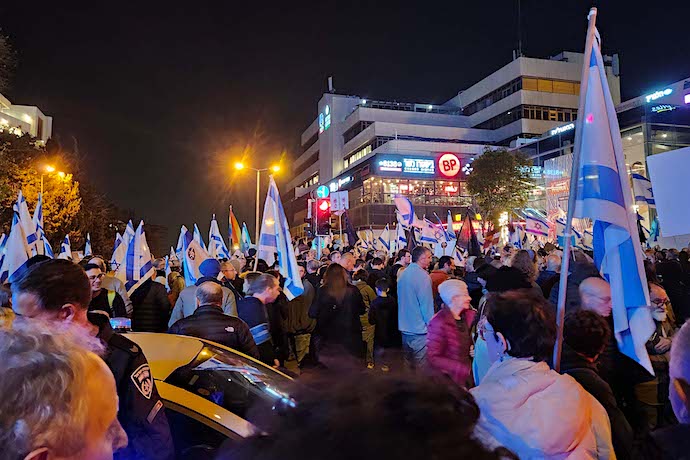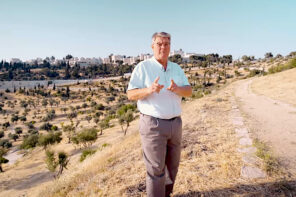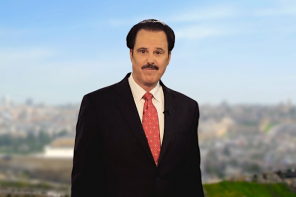A week after elections that produced the most far-right government in Israel’s history, the protests began—protests that increased exponentially in numerous cities and towns. In some way, it seemed, those in mourning had woken up as if rising from shiva (the seven days of mourning in the Jewish tradition). In that newfound exuberance against draconian government reforms—political, judicial, and cultural—the Left, center-left and some on the moderate Right (in Israel often referred to as the “soft right”) have raised their voice in opposition to certain government proposals. This should be cause for celebration in the midst of deep anxiety, but there’s something conspicuous in its absence.
The protests are indeed fighting against a threat to democracy created by a democratic election, flawed as it may be. Let us remember: this election was not an anomaly. In the four previous elections the results were quite similar. Electorally, this is where the country stands.
As important as these issues are, these protests are also bringing together a wide swath of Israeli society—and in some way that may be the point. These are protests to build a broad coalition of groups that may disagree on many things, but who all view the present government as a threat to Israel’s democracy as they see it. This includes the soft right, most of whom openly support the Occupation and the growth of settlements.
They may be right-wing, and even religious, but many have LGBTQ relatives, colleagues, workmates, or friends and they don’t believe they should face discrimination. More generally, these are protests against a reactionary Israeli Parliament that’s attempting to strengthen the legislative branch of government over the judiciary, a classic move toward authoritarianism in any democracy.
But what’s also striking is what these protests do not seem to be about: The Occupation, the plight of the Palestinians, housing demolitions, land expropriation—things that have been happening in the Occupied Territories for decades. There are certainly groups of protestors who carry anti-Occupation signs and chant anti-Occupation slogans. They’re present and their presence is felt.
But what brought 150,000 Jewish Israelis into the streets of Tel Aviv on a brisk winter evening in January wasn’t the Occupation; it was the various anti-democratic policies now making their way through Parliament. And let us not forget that there’s no Jewish political party in either the coalition or opposition apart from Labor (which is ineffectual in this government) that openly supports a two-state solution. Not Benny Ganz, not Gideon Sa’ar, and not Yair Lapid.
In other words, even for the Left and center-left—even as the Occupation marches on—it’s essentially over. It is no longer the core of the Left’s problems with the country. Amazingly, the Left and center-left accomplished what the Right has been trying to do unsuccessfully for decades: stifle the conversation about the Occupation. To change the subject.
This is not unintentional. In order for the center-left to attract the soft right to join its movement, discussion about the Occupation must be muted, or excluded. If the Occupation is at the center, the soft right will stay home. And so, in a sense, the Occupation is essentially sacrificed for the larger cause of Jewish democracy (“Jewish” because, since the Palestinians don’t live in a democracy that includes them, they essentially don’t live in a democracy at all). When Knesset member Ahmad Tibi was asked if Israel is a “Jewish and democratic state,” he responded, “This country is Jewish and democratic: Democratic towards Jews, and Jewish towards Arabs.”
Of course, sidelining the Occupation isn’t new. Many Israelis, even many on the center-left, are simply tired of the Occupation. Some may say, “Yes, we’re against the Occupation but that seems futile. Can’t we protest against something else?” LBGTQ rights, religious coercion, judicial reform—all are in need of serious attention and affect the lives of the protesters.
In some way, that’s part of what the security wall/barrier achieved; the Occupation became unseen. It’s “over there.” Things in Israel are, as they say, “quiet.” Which only means that Palestinians aren’t threatening the lives (or, apparently, consciences) of Israeli citizens, even as their own lives are threatened almost daily, by the IDF and by settler violence that goes largely unchecked. As even some on the Left have told me when I asked about the Occupation, “We have more important things to worry about first.” Fifty-three years and yet there are more important things now.
With that sentence the Occupation dies.
Other than West Bank Palestinians who, of course, lack the basic right, the Palestinian Israeli population has largely chosen not to participate in the protests—and for good reason. In some sense, it’s not about them. Yes, they will also be negatively impacted by these draconian policies; but as a senior colleague who works on these matters and supports the protests told me, “This is really a Jew v. Jew moment.” One sees only a few Palestinian flags at the protest, and it’s been reported that when anti-Occupation chants begin, they are often, though not always, muted.
Hypothetically, if these protests are successful and help reverse some of the polices now being considered, does anyone think 150,000 people will fill the streets of Tel Aviv to then protest the Occupation? It’s unlikely. After all, if that were the case why didn’t it happen before these elections?
Part of what we’re witnessing here is the normalization of the Occupation, and thus its obsolescence. Some on the (so-called) Left are using terms such as “shrinking the Occupation” to replace “end the Occupation.” In other words, we just have to be better occupiers to feel less like the oppressors that we are. Thus, a true irony emerges: despite the threat to democracy that these new policies represent, this shift of focus from ending the Occupation is the true death of Israeli democracy as it’s essentially normalizing apartheid while claiming it’s not apartheid at all.
In some bizarre way, these protests challenge the Right even as they benefit the Right. There are many on the Right who are sympathetic to the protests, despite having voted for the parties behind these new policies. Consider, for example, that in the so-called moderate religious Zionist city of Efrat in the Occupied West Bank, about 50% voted for Ben Gvir and Bezalel Smotrich’s far-right Religious Zionism Party.
And yet, what the Right cares about above all is getting Israelis to stop thinking about the Occupation; to stop using the term, to erase it. The settler movement is a one-state movement (albeit not a democratic one). And in some way, these new policies have created a protest movement that can only succeed if the Occupation is sidelined, which is precisely what the Right has wanted for decades.
Those not on the solid Right have found a new cause, and that should be celebrated. But that new cause is also quite telling. It’s telling us that, in a sense, the country has largely moved on from the Occupation. The settlers have won, even with these protests—and they’re likely to continue winning because they’ve changed the parameters of the conversation. To borrow an American football phrase, they’ve “moved the goal post.” And that may be the real demon in the shadows for those who care about democracy from the river to the sea.





